Blind faith in Western “prestige signals” serves exploiters, not nation-builders.
I write this article not because I want drama and takedowns. I write this in response to the years of witnessing the overglorification of tech saviors bringing their experience from Stanford to the Manila, more often than not inculcating the worst parts of their Paul Graham-infused thought in a colonized nation that needs healing, not speed and recklessness.
Silicon Valley means frontiers and innovation. Google offices on my Facebook feed make Makati towers look like corporate dread; the just as charming and in-reach vision of Richard Hendricks and friends in an overpriced hotspot in somewhere, Palo Alto is far better than the image of being in your parent’s home until your mid-twenties. Silicon Valley is synonymous with the picturesque image of founders in a garage, turning the banal and suffocating into foundations for the next Big Tech giant. ABC is to FAANG, execution is everything, and it’s a time to build. It is everything that the Philippines is not: all the taciturn bureaucrats turned into angel investors and good company always eager to hear the next thing you build. Charm in the right spots of America mirrors the best of Filipino hospitality.
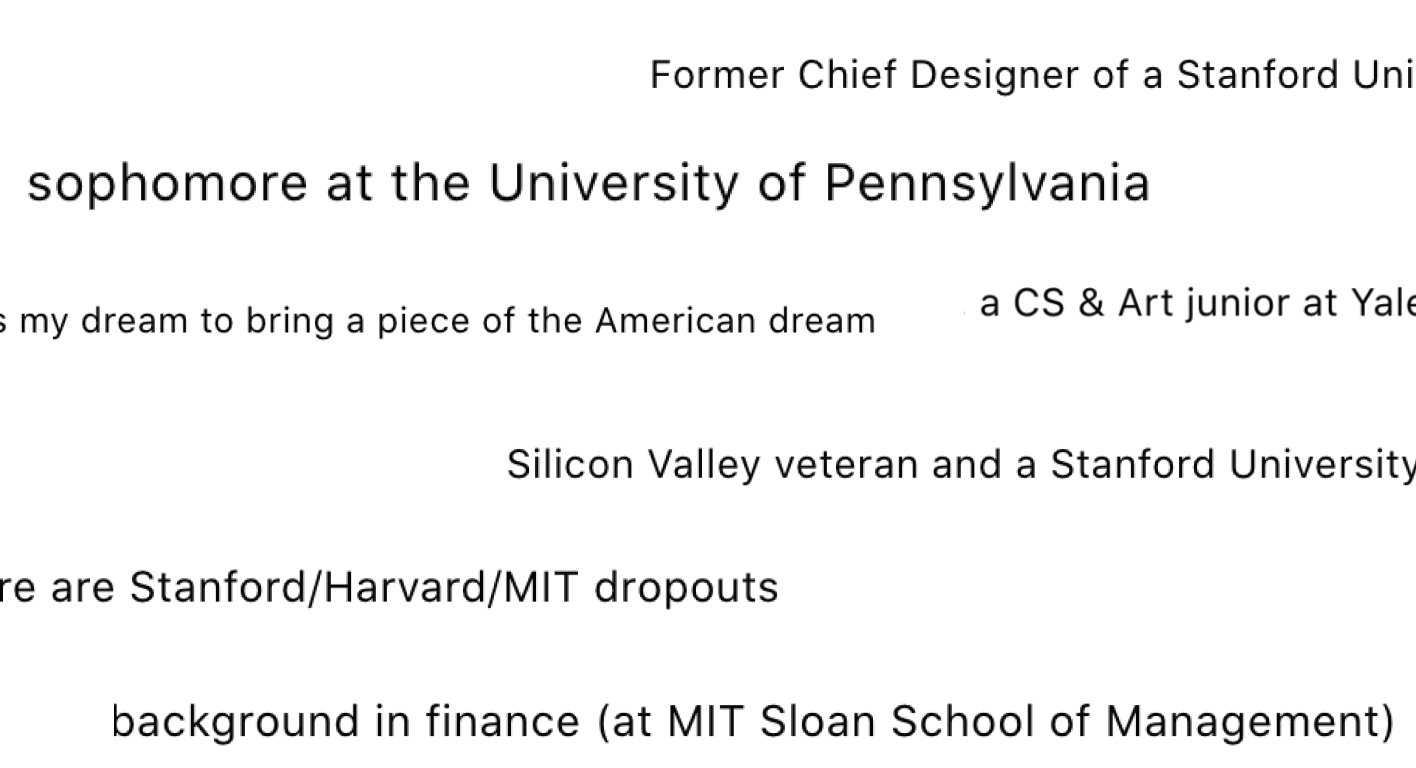
Garage mythologies are all birthed from some semblance of truth, yet is always delivered with the convenient details grayed out. Google was started in a garage, but by Ph.D. students at Stanford University — yes. Facebook’s origins as Facemash, even if covered on the big screen in The Social Network, are now ignored. Note that this was also a product of friends in a Harvard dorm room, one of the world’s most ‘prestigious’ universities. However, Silicon Valley has also paved the way for immigrant founders who look more like us. The best example is perhaps Dado Banatao, son of a rice farmer and housekeeper that had taken on the opportunity to study at Stanford and literally be a part of the logic and chips that Silicon Valley takes its namesake from –– of course, far removed from much of the software-driven hype that now surrounds Silicon Valley sentiment.
Rags to riches stories are classic Filipino breakfast. We are a nation built on gameshows and televised competitions that double as sympathy contests for tragic backstories. We learn to perform our trauma, centering our identities and worth over it until a better laurel can be claimed. Pacquiao had suffered due to poverty, risen to boxing, and with little credentials, the Senate — now eyeing the presidency. He will always be forgiven because of his story, no matter how much his comments endanger the LGBTQ population or enable a fascist dictator to maintain control over his seat. A line on his Wikipedia page is even dedicated to his own vision of angels and God.
This is why it’s understandable that Silicon Valley is a dream to chase. From (almost) nothing come world leaders and visionaries that transform day-to-day life as we know it. Moreover, it’s a palatable, tangible dream that isn’t too removed from our lives today — as it’s no longer a place, but a mindset.
Your next investor is a tweet away. Angkas commutes and marketing have transformed transportation options for the tech-savvy middle-class. The promise of working with high-energy, creative minds beyond a land of outsourcing and the drone of multinational corporate drones is infectious. All of Silicon Valley waits on your computer, presumably.
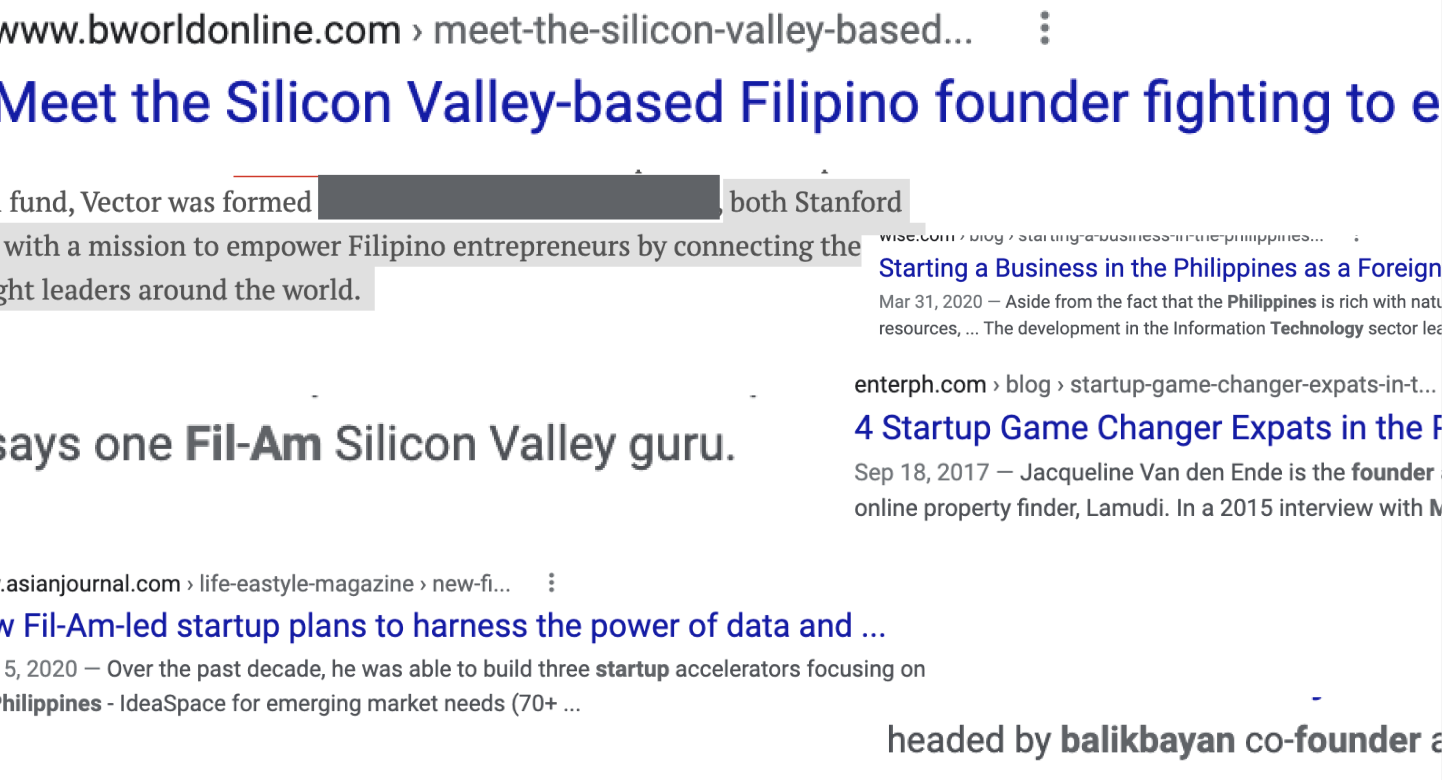
But it’s not as easy as that. First, you assume that one has the privilege of a functioning laptop, decent wifi in a nation bestowed with one of the world’s worst internet infrastructure, and time at all to immerse yourself in the coded complexities of thinking like the ideal technopreneur. Pandemic aside, most engineers and tech workers have little time for self-growth amidst commutes and workplace chaos that optimizes Filipinos for output and craft over solemnity, space for thought or original movement. Graduates of prestigious universities are given more legroom in the corporate networking game. Balikbayans who huddle back to BGC are given all the benefit of the doubt on their work history — what matters is that they now hold the torch of innovation. They are here to save the Philippines.
I often wonder how much venture capital funding goes to startups founded by Filipinos, of Filipino citizenship and descent.
We have more “quick and easy, get rich”-esque how-tos and guides written for expatriates and white founders seeking to bring out their patriarchal and colonist ideals to the Philippines than we do guides for actual Filipinos. An e27 article points out how most founders get their bachelor’s at local universities before pursuing some form of higher education at Harvard, NYU, the London School of Economics, or even Santa Clara University––where bringing any Western degree (or maybe even a certificate from a one-week Summer conference hosted by the local business club) is virtuous enough and more mighty than the less sexy state school names. Most founders profiled by e27 solving ‘Filipino’ problems tout degrees from abroad. When it comes to the next Ignite or panel discussion, you can expect that they’re introduced by these credentials: ex-Stanford, ex-VC-backed, ex-Silicon Valley––whatever that means. Before solving the issues of the nation, you need the credentials to back it up. In a nation of idolatry and spectacle, this is where degrees (or again, one-week program certifications) come helpful: enter a Harvard conference and drag it over De La Salle University on your LinkedIn’s education section.
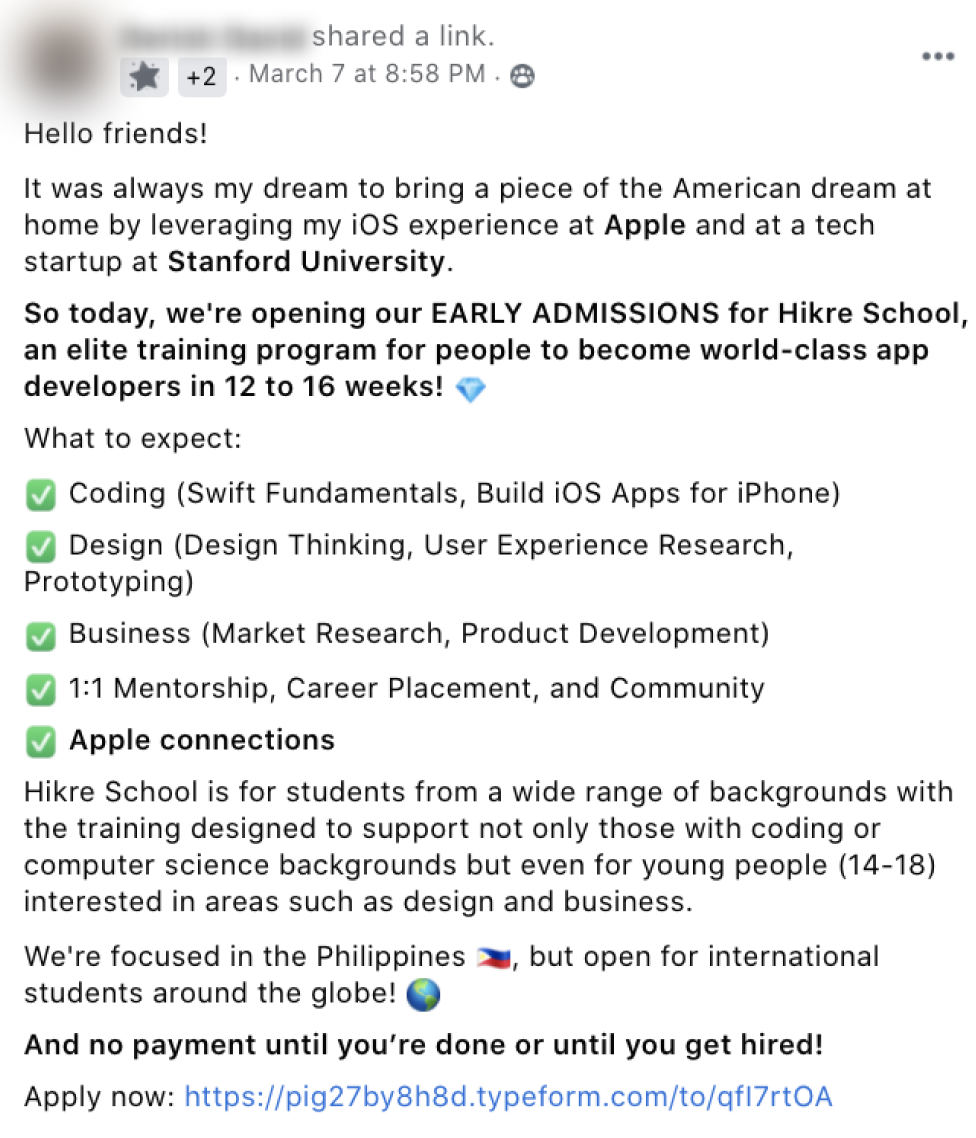
One informal stomping ground of the Philippine tech scene is the 38,000 member Startup PH Facebook group. After the launch of Christian San Jose’s UX+ University and Avion School’s 2020 success for software engineers, a new school focused on iOS development popped up. Seemed fine.
Earlier today, I received an email in my inbox from a familiar founder sharing more on what they’re building, and I write this verbatim, “the Apple of EdTech Platforms,” giving me a closer opportunity to understand the up-and-coming platform. They kindly outlined how they were bringing the American dream home, leveraging experience as an ex-Apple (in actuality, Apple’s Developer Academy Program with a curriculum in Swift–not any formal work experience — though they describe it as work experience) and ex-Chief Designer at a “Stanford University-founded startup”. Of the approximately 7,000 undergraduates enrolled at Stanford, I wonder how legitimate this is as a signal of prestige. (I go to Yale, and I can introduce you to several ‘Ivy League-founded startups’ that are shitty Tinder-like clones built off “Create React App” starters that exist solely to help the founders get laid.)
The startup’s domain now leads to a dead link.
Several times in the email did the founder reiterate that the company was ‘American-founded’, because presumably, this is better than being Filipino-founded. From two years of education in an American State School will this twenty-something founder bring to the “3rd world” Philippines world-class Swift education and connections at Apple.
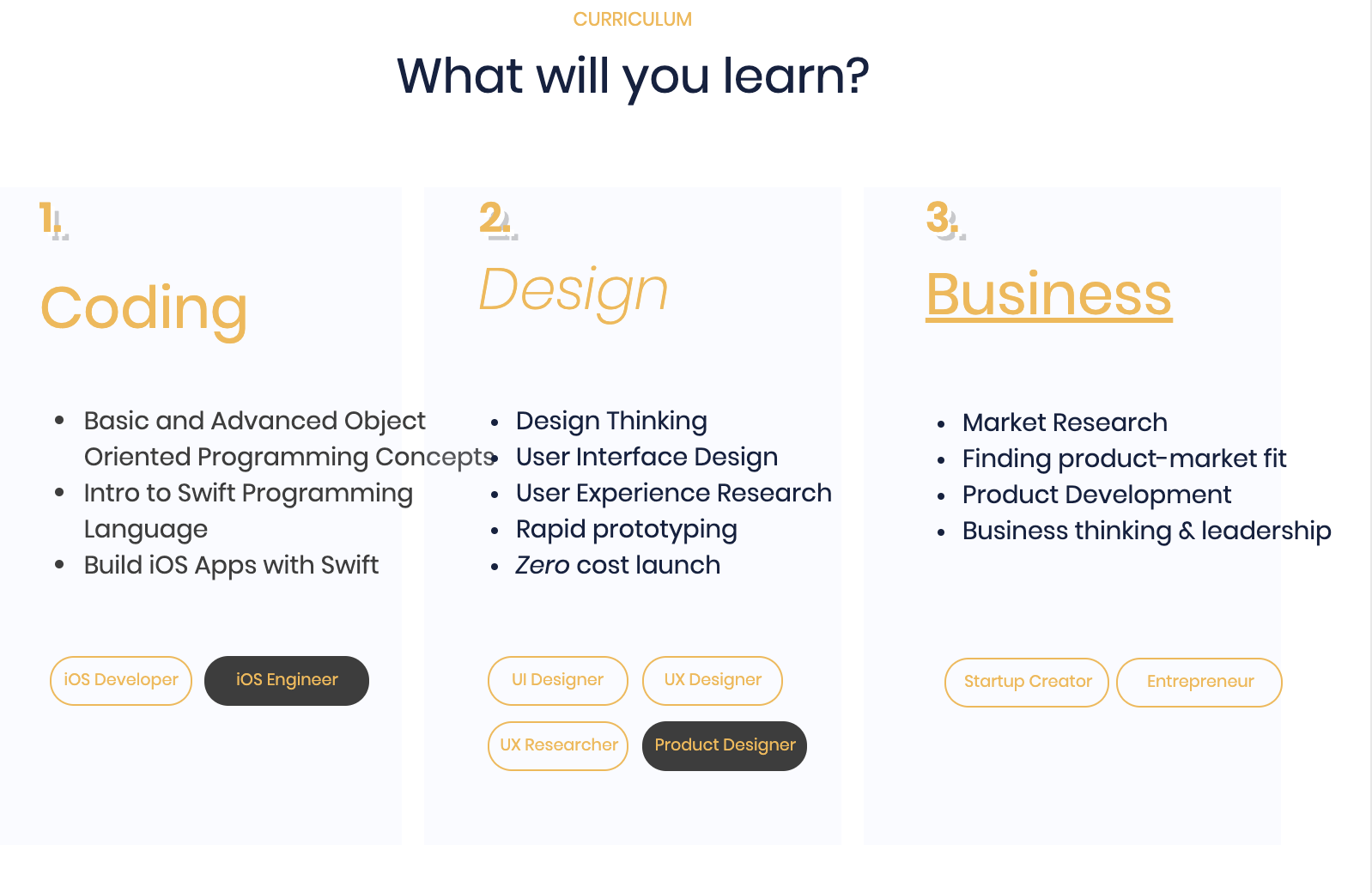
Showcased on Wix is a curriculum that consists of Coding, <em>Design</em>, and <u>Business</u> is a disorderly curricula that isn’t self-assured in labeling potential career paths. For instance, Zero cost launch is listed under “Design”, and “iOS Engineer” is blacked out while nothing in the <u>Business</u> section is. The school charges Php80,000 upfront so you can learn from this founder’s ex-Apple (again, a free Apple Developer Course) background or pay through an income-sharing agreement. It’s as if we haven’t learned that Lambda-likebootcampsarepredatory (three separate tweets for you to digest here)––especially when they assuage the uncertainty in dropping your entire life to learn from non-existent instructors through the lofty promise of Silicon Valley-style practices and employment. (The founder started validating the idea in March, and the bootcamp opens up in June. Who is going to be teaching aside from them?)
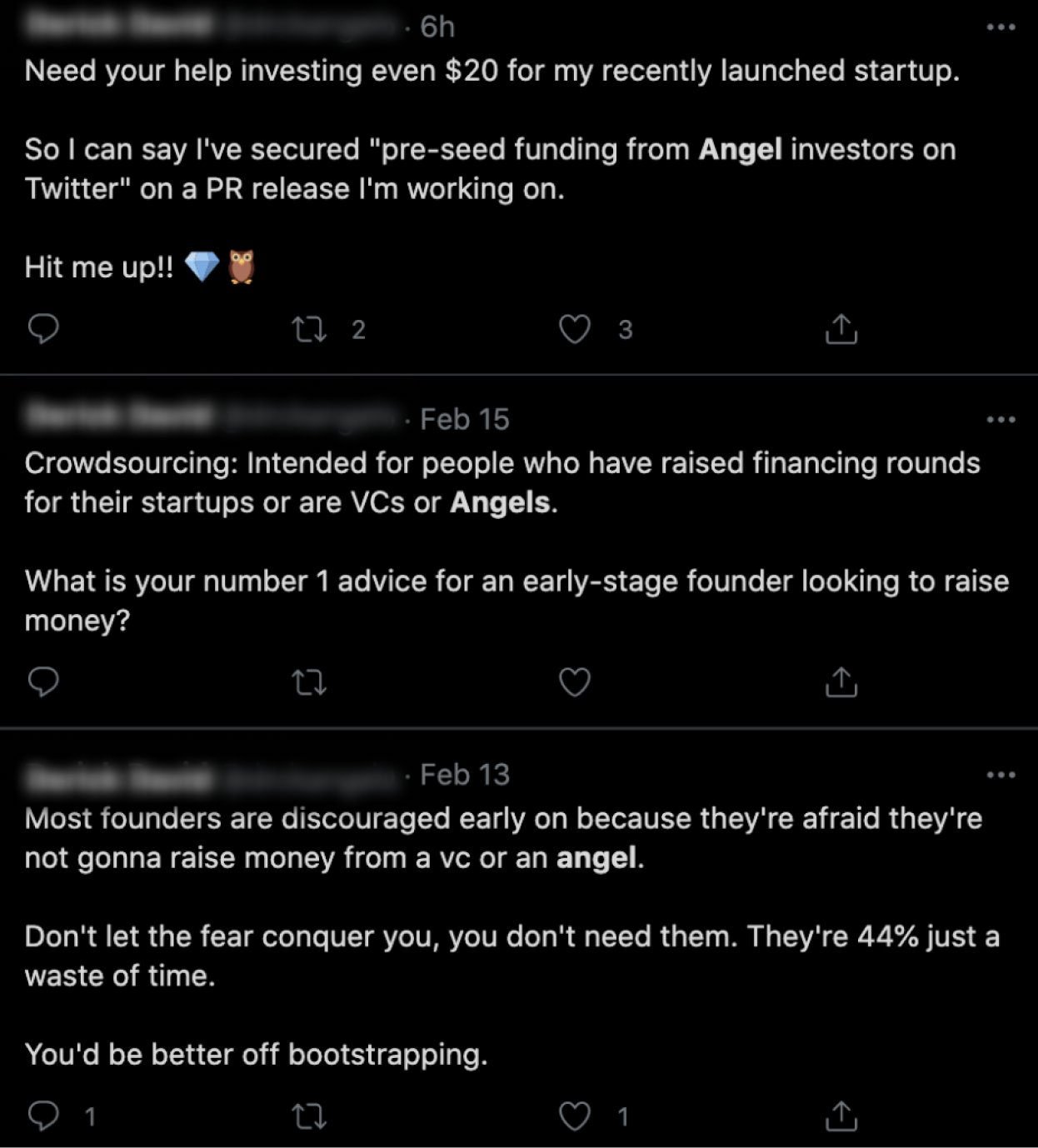
Heading to the founder’s Twitter, I’m not sure if this is some sort of sick, twisted joke to see how much marketing speak and bulleted talking points it takes to get buy-in from a group with no idea on what you’re doing. The screenshot above, begging for Php1,000 so that they can use “pre-seed funding from Angel investors on Twitter” on a press release should say it all. (All likes and retweets are from the founder’s own accounts.)
This isn’t meant as a diss to the Apple of EdTech. Do we want the Philippines to be the home of more Elizabeth Holmes-types, literally mimicking the look and language of Jobs and the giants, deepening her voice to velvet falsehoods outfitted in black high-neck sweaters to buy her way into the seats of funds, scamming their way towards a $9 billion dollar valuation? Is this not just the spectacle of politics that local entrepreneurs claim our ecosystem to be distanced from, only outfitted differently? It’s Jordan Peterson instead of Duterte, Paul Graham instead of Miriam Santiago. As it is now, we’re falling into the same traps of our politics. Everything is personality politics once more. No true Filipino ideals will come out of this.
It’s all a weary sigh at how Filipinos feel the need to reach for international titles, often at the expense of actual work done/to show for, and how Western idolatry is opening up avenues of exploitation. Php80,000/$1,600USD, nearly 4–5 months of income for top university graduates in the Philippines is nothing to scoff at — especially when Filipinos scrounge up the money to pay for this in expectation of connections and job opportunities that don’t really exist. If they’re not there for the founder, less so will they be for any students. Borrowed from the “move fast and break things” culture are the press release-first founders building with confidence before thought, never altering the nation’s broken systems, only reinforcing it with white supremacy and pathways that we are far from reclaiming. Silicon Valley celebrates the technical over the social, and when we bring this into a nation that has long been plagued careful political ploys to transfer power to the already-mighty, we fall victim and never see any true form of change or disruption, contrary to the dream that many of us had foresaw.
In title, Silicon Valley means nothing. What we can learn from, however, are the roots in technology research and education that enabled it to foster the richness of mind, creative thought, and ways of collaboration that have transformed the way we look at the field forever. As the Valley disperses into hundreds of hubs worldwide, we look at the way energy is shared, communicated, and most of all — the faith that placed in founders. Once we treat every engineer, technologist, designer, or entrepreneur with the same kindness (or at the very least, a more balanced sense of criticality), we can enable opportunity not only for the expatriate or exploiter carrying fraudulent titles, but for the genuine founder creating for the Philippines he has long witnessed and been a part of.
Full disclosure: Again, I am someone now part of the “American dream” that this founder and many others chase. I go to university in America, and because of it, receive more kindness and good faith than I deserve. Before I even took a leap into the Philippine startup ecosystem in high school, I know that I’ve been making space to help other technologists and designers enter the industry tactfully with ethics and rationality behind the hard skills and craft — and will also continue doing so for the rest of my life. I believe that this kind of thinking is what the Philippines needs. Intentionally ensuring that I absorb as much as what I can of the good, “hard” skills and “soft” skills (debatable, but the latter is far more important in my head) to practices at home, but first trusting myself in founders and students that know the issues that I’ve intentionally chosen to draw myself away from physically. Investment in education instead of blind faith in the saviorism that often permeates founders who have often left America for a reason, causing more harm than good in their rapid pace.
More than just a jab at some kid trying to follow in Austen Allred’s legacy is a larger question about the values and principles we look for in our emerging ecosystem — most of all, how we undervalue and underinvest in local education. Instead of praising extension school graduates or wealthy silver spoon families who can throw thousands of dollars into summer Ivy League Programs, when will we spend time uplifting local founders who have the lived experienced necessary to actually disrupt education? What can international connections bring to our larger society, if not false promise and elitism? Have we studied what bootcamps can look like when connected with local educational institutions and employers instead of entrusting it all into Slack messages exchanged between YC Alumni? When will quick and dirty change actually lead into a systematic upheaval? Will it ever, and has it ever?
The savior of the Philippines will come from the Philippines, and the ‘savior’ not any one person, but result from a participatory revolution that listens to the people before them and now working to better the Philippines in the incremental yet radical ways that have long been enforced. This will not happen when we choose to listen to people who first have to craft persona in the likelihood of Naval or Patrick Collison before we decide that they have ideas worth hearing (often, they don’t). We are already a marginalized and colonized people. Do we want slick and shiny Stanford startups that seem to stand ground more because of the “Stanford” part than the actual issue they’re solving? Must the entrepreneurs tack on useless vocabulary exchanged around Clubhouse to be heard? Will we let Holmes-like founders exploit Filipinos out of hundreds of thousands of pesos, life-changing sums of money in our nation?
Our nation is rife with leaders, educators, thinkers, and students that are far more involved than the girl or boy who has optimized their whole life for the degree. It’s time we carve out space for them.